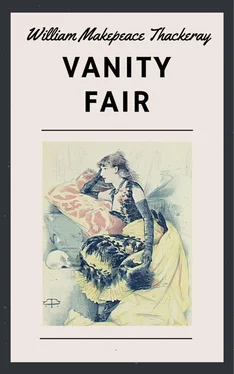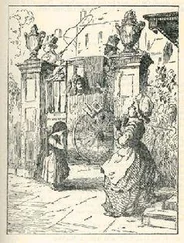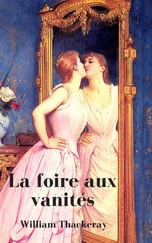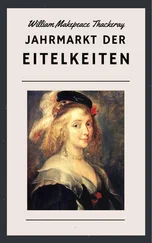Title Page William Makepeace Thackeray Vanity Fair
BEFORE THE CURTAIN
CHAPTER I: Chiswick Mall
CHAPTER II: In Which Miss Sharp and Miss Sedley Prepare to Open the Campaign
CHAPTER III: Rebecca Is in Presence of the Enemy
CHAPTER IV: The Green Silk Purse
CHAPTER V: Dobbin of Ours
CHAPTER VI: Vauxhall
CHAPTER VII: Crawley of Queen's Crawley
CHAPTER VIII: Private and Confidential
CHAPTER IX: Family Portraits
CHAPTER X: Miss Sharp Begins to Make Friends
CHAPTER XI: Arcadian Simplicity
CHAPTER XII: Quite a Sentimental Chapter
CHAPTER XIII: Sentimental and Otherwise
CHAPTER XIV: Miss Crawley at Home
CHAPTER XV: In Which Rebecca's Husband Appears for a Short Time
CHAPTER XVI: The Letter on the Pincushion
CHAPTER XVII: How Captain Dobbin Bought a Piano
CHAPTER XVIII: Who Played on the Piano Captain Dobbin Bought
CHAPTER XIX: Miss Crawley at Nurse
CHAPTER XX: In Which Captain Dobbin Acts as the Messenger of Hymen
CHAPTER XXI: A Quarrel About an Heiress
CHAPTER XXII: A Marriage and Part of a Honeymoon
CHAPTER XXIII: Captain Dobbin Proceeds on His Canvass
CHAPTER XXIV: In Which Mr. Osborne Takes Down the Family Bible
CHAPTER XXV: In Which All the Principal Personages Think Fit to Leave Brighton
CHAPTER XXVI: Between London and Chatham
CHAPTER XXVII: In Which Amelia Joins Her Regiment
CHAPTER XXVIII: In Which Amelia Invades the Low Countries
CHAPTER XXIX: Brussels
CHAPTER XXX: "The Girl I Left Behind Me"
CHAPTER XXXI: In Which Jos Sedley Takes Care of His Sister
CHAPTER XXXII: In Which Jos Takes Flight, and the War Is Brought to a Close
CHAPTER XXXIII: In Which Miss Crawley's Relations Are Very Anxious About Her
CHAPTER XXXIV: James Crawley's Pipe Is Put Out
CHAPTER XXXV: Widow and Mother
CHAPTER XXXVI: How to Live Well on Nothing a Year
CHAPTER XXXVII: The Subject Continued
CHAPTER XXXVIII: A Family in a Very Small Way
CHAPTER XXXIX: A Cynical Chapter
CHAPTER X: In Which Becky Is Recognized by the Family
CHAPTER XLI: In Which Becky Revisits the Halls of Her Ancestors
CHAPTER XLII: Which Treats of the Osborne Family
CHAPTER XLIII: In Which the Reader Has to Double the Cape
CHAPTER XLIV: A Round-about Chapter between London and Hampshire
CHAPTER XLV: Between Hampshire and London
CHAPTER XLVI: Struggles and Trials
CHAPTER XLVII: Gaunt House
CHAPTER XLVIII: In Which the Reader Is Introduced to the Very Best of Company
CHAPTER XLIX: In Which We Enjoy Three Courses and a Dessert
CHAPTER L: Contains a Vulgar Incident
CHAPTER LI: In Which a Charade Is Acted Which May or May Not Puzzle the Reader
CHAPTER LII: In Which Lord Steyne Shows Himself in a Most Amiable Light
CHAPTER LIII: A Rescue and a Catastrophe
CHAPTER LIV: Sunday After the Battle
CHAPTER LV: In Which the Same Subject is Pursued
CHAPTER LVI: Georgy is Made a Gentleman
CHAPTER LVII: Eothen
CHAPTER LVIII: Our Friend the Major
CHAPTER LIX: The Old Piano
CHAPTER LX: Returns to the Genteel World
CHAPTER LXI: In Which Two Lights are Put Out
CHAPTER LXII: Am Rhein
CHAPTER LXIII: In Which We Meet an Old Acquaintance
CHAPTER LXIV: A Vagabond Chapter
CHAPTER LXV: Full of Business and Pleasure
CHAPTER LXVI: Amantium Irae
CHAPTER LXVII: Which Contains Births, Marriages, and Deaths
Imprint
William Makepeace Thackeray
Vanity Fair
As the manager of the Performance sits before the curtain on the boards and looks into the Fair, a feeling of profound melancholy comes over him in his survey of the bustling place. There is a great quantity of eating and drinking, making love and jilting, laughing and the contrary, smoking, cheating, fighting, dancing and fiddling; there are bullies pushing about, bucks ogling the women, knaves picking pockets, policemen on the look-out, quacks (OTHER quacks, plague take them!) bawling in front of their booths, and yokels looking up at the tinselled dancers and poor old rouged tumblers, while the light-fingered folk are operating upon their pockets behind. Yes, this is VANITY FAIR; not a moral place certainly; nor a merry one, though very noisy. Look at the faces of the actors and buffoons when they come off from their business; and Tom Fool washing the paint off his cheeks before he sits down to dinner with his wife and the little Jack Puddings behind the canvas. The curtain will be up presently, and he will be turning over head and heels, and crying, "How are you?"
A man with a reflective turn of mind, walking through an exhibition of this sort, will not be oppressed, I take it, by his own or other people's hilarity. An episode of humour or kindness touches and amuses him here and there—a pretty child looking at a gingerbread stall; a pretty girl blushing whilst her lover talks to her and chooses her fairing; poor Tom Fool, yonder behind the waggon, mumbling his bone with the honest family which lives by his tumbling; but the general impression is one more melancholy than mirthful. When you come home you sit down in a sober, contemplative, not uncharitable frame of mind, and apply yourself to your books or your business.
I have no other moral than this to tag to the present story of "Vanity Fair." Some people consider Fairs immoral altogether, and eschew such, with their servants and families: very likely they are right. But persons who think otherwise, and are of a lazy, or a benevolent, or a sarcastic mood, may perhaps like to step in for half an hour, and look at the performances. There are scenes of all sorts; some dreadful combats, some grand and lofty horse-riding, some scenes of high life, and some of very middling indeed; some love-making for the sentimental, and some light comic business; the whole accompanied by appropriate scenery and brilliantly illuminated with the Author's own candles.
What more has the Manager of the Performance to say?—To acknowledge the kindness with which it has been received in all the principal towns of England through which the Show has passed, and where it has been most favourably noticed by the respected conductors of the public Press, and by the Nobility and Gentry. He is proud to think that his Puppets have given satisfaction to the very best company in this empire. The famous little Becky Puppet has been pronounced to be uncommonly flexible in the joints, and lively on the wire; the Amelia Doll, though it has had a smaller circle of admirers, has yet been carved and dressed with the greatest care by the artist; the Dobbin Figure, though apparently clumsy, yet dances in a very amusing and natural manner; the Little Boys' Dance has been liked by some; and please to remark the richly dressed figure of the Wicked Nobleman, on which no expense has been spared, and which Old Nick will fetch away at the end of this singular performance.
And with this, and a profound bow to his patrons, the Manager retires, and the curtain rises.
LONDON, June 28, 1848
While the present century was in its teens, and on one sunshiny morning in June, there drove up to the great iron gate of Miss Pinkerton's academy for young ladies, on Chiswick Mall, a large family coach, with two fat horses in blazing harness, driven by a fat coachman in a three-cornered hat and wig, at the rate of four miles an hour. A black servant, who reposed on the box beside the fat coachman, uncurled his bandy legs as soon as the equipage drew up opposite Miss Pinkerton's shining brass plate, and as he pulled the bell at least a score of young heads were seen peering out of the narrow windows of the stately old brick house. Nay, the acute observer might have recognized the little red nose of good-natured Miss Jemima Pinkerton herself, rising over some geranium pots in the window of that lady's own drawing-room.
Читать дальше












